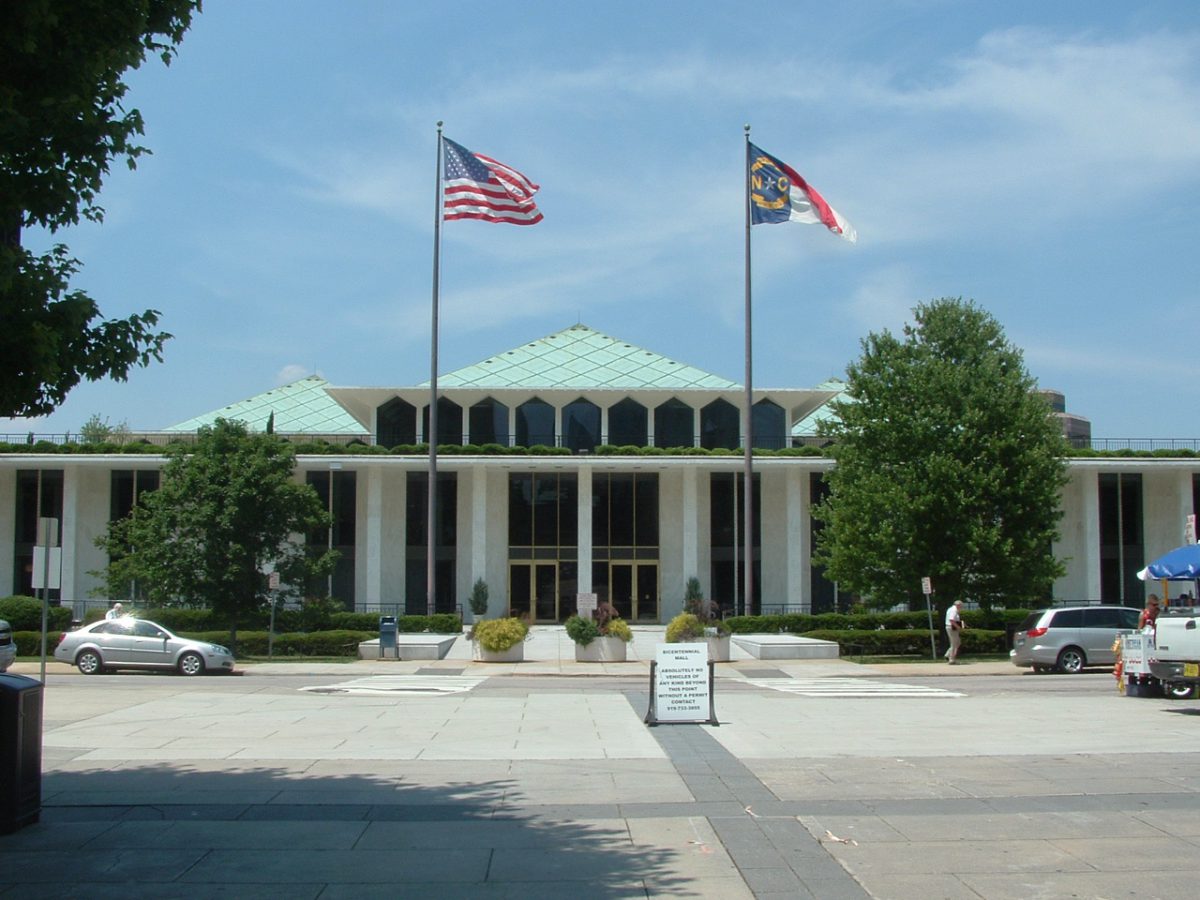
Environmental groups are pushing for changes in biogas provisions that are part of this year’s farm bill, saying the legislation takes away important oversight of the new technology.
The Farm Act of 2021, Senate Bill 605, would put the projects under a combined general permit, rather than require each project to go through the permitting process.
Supporter Spotlight
Advocates of the move say it’s necessary in order to speed up the process for the facilities, which can take more than a year to complete.
The biogas operations would pump methane captured from hog lagoons to a central collection point where it can be converted to renewable natural gas, or RNG, and then burned for fuel to generate electricity.
Last year, a partnership between Smithfield Foods, Duke Energy and biogas developer OptimaBio opened an RNG facility using wastewater from Smithfield’s Tar Heel plant.
Smithfield and Dominion Energy recently announced plans for a network of swine farms connected via pipelines to a major new RNG production facility in Duplin County.
Environmental groups have opposed the plan, saying that the infrastructure and digesters pose a risk to air and water quality and moving the facilities under a general permit would eliminate oversight and public input.
Supporter Spotlight
Senate Agriculture, Environment and Natural Resources chairman Brent Jackson, R-Sampson, said last week that he wants to see state environmental regulators move faster on the biogas projects.
In a series of questions during confirmation hearings for Department of Environmental Quality Secretary Dionne Delli-Gatti, Jackson cited the 18 months it took for the Tar Heel facility and said it was unfair to force companies to wait so long for projects to be approved.
Delli-Gatti said that one complication in that case involved a new kind of facility and new type of application and permit process. DEQ has been in conversations about the process with industry representatives since, she said.
“One of the things I am pleased to hear, we’ve met with the industry since then, and they have indicated they felt that the permits, and the requirements of the permits are fair,” she said.
The Farm Act of 2021 is scheduled to be heard in Jackson’s committee on Tuesday. The meeting agenda, materials and livestream will be available online.
Delli-Gatti confirmation hearings

Senators spent about two hours questioning Delli-Gatti, whom Gov. Roy Cooper nominated for the DEQ secretary position in February after President Joe Biden picked her predecessor, Michael Regan, to be the top administrator at the Environmental Protection Agency.
Like Regan, she’s been on the job for months ahead of the formal Senate confirmation process. She and Regan are the only DEQ secretaries to go through the confirmation process. The legislature initiated the confirmation requirement for a governor’s cabinet-level appointees under legislation passed in December 2016, ahead of the partisan shift in the governorship from Republican Pat McCrory to Cooper, a Democrat.
Senators used part of Delli-Gatti’s hearing to take aim at Cooper’s climate change proposals, along with questions on decommissioning solar facilities, and the future of natural gas and electric automobiles.
Sen. Paul Newton, R-Cabarrus, focused on carbon-reduction goals in Cooper’s Clean Energy Plan and the state’s renewable energy portfolio standards. He said they seemed pointless and costly given that India and China are continuing to build coal plants that will far offset the state’s reductions.
“What is the value to North Carolinians for charging them billions of dollars to reduce carbon emissions?” Newton asked. He pressed Delli-Gatti on whether any of the state’s carbon-reduction plans would reduce sea level rise or storms in North Carolina.
Delli-Gatti stressed that the governor’s plans are focused on building resiliency to the effects of sea level rise and more powerful storms. She defended the carbon-reduction goals, saying the hope is that through greater cooperation on reductions, some of the trends experienced here can be reversed.
Jackson said he expects to schedule a follow-up to last week’s confirmation hearing, but it had yet to be scheduled as of Monday. Under the 2016 statute, the Senate must confirm Delli-Gatti’s appointment during this session for her to remain in the job.
Bill adds teeth to native plant requirements
Last Tuesday, Sen. Bill Rabon, R-Brunswick, announced to members of the Senate Agriculture, Environment and Natural Resources committee that he was no tree hugger.
Fans of the Bradford pear and crepe myrtle would heartedly agree.
Rabon took a rhetorical ax to both nonnative trees while advocating for his Native Plant Right to Work Act — Senate Bill 628 — saying there was nothing good to say about the Bradford pear and he never saw a crepe myrtle that didn’t need a chainsaw.
He said it was time for the state to put some teeth into a law that now only “strongly encouraged” the use of native plants by state agencies and in projects that use state funds.
The new legislation would make that a must for local government projects using Powell Bill funds or grants from the State Parks and Recreation Trust Fund and the Land and Water Fund, the new name for the combined Natural Heritage Trust Fund and the Clean Water Management Trust Fund. It also prohibits the use of nonnative plants by state agencies and on state property.
The bill passed the committee, but not without criticism from some nursery operations that sell nonnative plants. It now heads to the Senate Rules and Operation Committee.
Rabon, chair of that committee, said he is willing to carve out some exceptions for disease-resistant hybrids or ground-cover species in heavy use by the Department of Transportation, but he said it’s time to get serious about protecting native species and the birds and pollinators that rely on them and stop letting agencies and local governments off the hook when it comes to using native plants.
“Along our highways and our state property we can help the birds and pollinators make a living every day,” Rabon said.
Crossover approaches
The General Assembly session kicks into high gear this week with fast-approaching deadlines for bills to be considered during the 2021 session.
Tuesday is the House filing deadline for all nonbudget-related bills and next Tuesday is the budget bill deadline. Senate deadlines were in early April.
The session’s crossover for both House and Senate deadline is May 13. After that, only bills that have passed at least one chamber are considered viable for the remainder of the session, although on occasion provisions from bills that fail to make the crossover deadline resurface in other legislation.
The lead-up to the filing deadlines is a busy time at the House Clerk’s Office, where 78 bills were filed last week.









